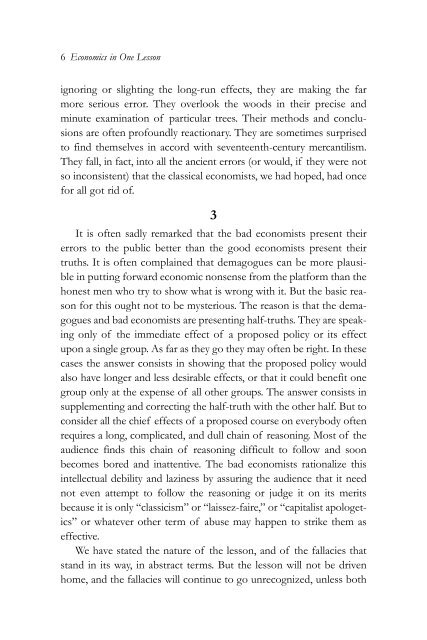1gDdM7w
1gDdM7w
1gDdM7w
- No tags were found...
You also want an ePaper? Increase the reach of your titles
YUMPU automatically turns print PDFs into web optimized ePapers that Google loves.
6 Economics in One Lessonignoring or slighting the long-run effects, they are making the farmore serious error. They overlook the woods in their precise andminute examination of particular trees. Their methods and conclusionsare often profoundly reactionary. They are sometimes surprisedto find themselves in accord with seventeenth-century mercantilism.They fall, in fact, into all the ancient errors (or would, if they were notso inconsistent) that the classical economists, we had hoped, had oncefor all got rid of.3It is often sadly remarked that the bad economists present theirerrors to the public better than the good economists present theirtruths. It is often complained that demagogues can be more plausiblein putting forward economic nonsense from the platform than thehonest men who try to show what is wrong with it. But the basic reasonfor this ought not to be mysterious. The reason is that the demagoguesand bad economists are presenting half-truths. They are speakingonly of the immediate effect of a proposed policy or its effectupon a single group. As far as they go they may often be right. In thesecases the answer consists in showing that the proposed policy wouldalso have longer and less desirable effects, or that it could benefit onegroup only at the expense of all other groups. The answer consists insupplementing and correcting the half-truth with the other half. But toconsider all the chief effects of a proposed course on everybody oftenrequires a long, complicated, and dull chain of reasoning. Most of theaudience finds this chain of reasoning difficult to follow and soonbecomes bored and inattentive. The bad economists rationalize thisintellectual debility and laziness by assuring the audience that it neednot even attempt to follow the reasoning or judge it on its meritsbecause it is only “classicism” or “laissez-faire,” or “capitalist apologetics”or whatever other term of abuse may happen to strike them aseffective.We have stated the nature of the lesson, and of the fallacies thatstand in its way, in abstract terms. But the lesson will not be drivenhome, and the fallacies will continue to go unrecognized, unless both


